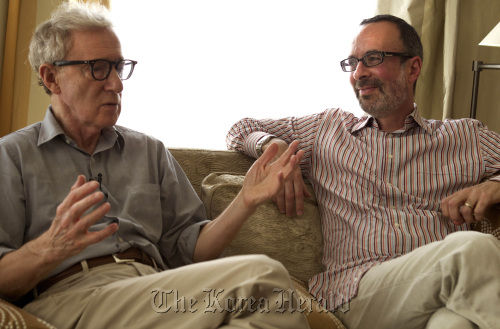BEVERLY HILLS ― Writer-filmmaker Woody Allen may be a private kind of a guy, but when it comes to deconstructing Woody, everybody’s eager to lend a hand.
Documentary filmmaker Robert Weide managed to charm his way into Allen’s good graces and the result is the two-parter on PBS’ “American Masters,” “Woody Allen: a Documentary,” airing Nov. 20 and 21.
“I’ve known him a little bit for a number of years because years ago I headed development for Rollins and Joffe, who were his producers’ managers,” Says Weide at a press gathering here.
 |
Woody Allen (left) is the subject of Robert Weide’s “Woody Allen: a Documentary” airing on PBS’ “American Masters” Nov. 20 and 21. (MCT) |
“So it was like a very minor acquaintanceship, a little hello in the hallway or something. But he was in my first film, which was of the Marx Brothers, which was also a PBS show, ‘Marx Brothers in a Nutshell,’ back in ’82 ― 30 years ago. I don’t know how that happened.”
Weide says he approached Allen about a documentary a few times over 25 years, but was always rejected. Shy and self-effacing, Allen hates being the center of attention, says Weide.
“With this, he doesn’t have to show up anywhere. I just put the camera on him, but in any event, I finally wrote him again ― this goes back to October of ’08 ― to first seek permission to do it, and I just really made the case in my letter to him, and I said it’s time for this. He also knows all my work because we share all the same heroes in the Marx Brothers and Mort Sahl and W.C. Fields.”
Finally Allen relented and sat still for six face-to-face interviews with Weide, allowed the documentarian to visit the set, accompany him to Cannes and even shoot Allen in the process of filming (a rarity in most bio-docs).
Weide’s film is significantly enhanced by the actors who’ve worked with Allen and are only too eager to talk about their experiences. Mira Sorvino, who earned an Oscar for her hooker in “Mighty Aphrodite,” says she never saw a script before she accepted the role and had to decline a juicy part in “Hackers” to take it.
“I had read two scenes of it in the auditions, and that’s all I knew of it. For all we knew, it could have just been those two scenes. They were very, very secretive about what size the role was, what kind of a role it was. They didn’t even tell me in the first audition that she was a prostitute. I had to guess it from the lines and say, ‘Is she a call girl?’ ‘Yes,’ (casting agent) Juliet Taylor said, but very reluctantly. And so when I finally got to read it after having said, ‘Well, it’s worth it even if it’s those two scenes because they’re very funny.’ I was overjoyed. I mean, I was laughing as I turned page after page. I was dying because I was like, ‘This is the best role I have ever read. I am so thrilled.’”
Mariel Hemingway was only 17 when she was cast as the very young love interest in “Manhattan.” “It wasn’t a well-rounded character in writing,” she says. “It really kind of was a character that blossomed out of the creation of this movie. It was the first time I’d ever done any improvisational work at all. But he sort of really groomed my character to come from a total place of innocence and spontaneity.”
“So my character came from that, and I think that is what’s wonderful about how he works is that he chooses people that he knows are talented, and he allows their talent to really come forth. It’s very natural. It’s very real. And whatever is their strength ― I don’t even know how he really brings it out because he doesn’t talk to many people.”
Weide weaves the perspectives of folk like Sean Penn, Diane Keaton, Josh Brolin, Martin Scorsese, Penelope Cruz and and Allen’s sister-producer, Letty Aronson, into the mix. “Scarlett Johansson describes Woody as cripplingly shy, which is true. He’s not standoffish. It’s not an arrogance thing,” says Weide.
“He’s genuinely shy, and he always was. And when he was doing standup, the way he says it is, once he got on stage ― this is the performer’s thing ― is the spotlight hits them and they’re on stage and they’re fine. But backstage, he would be nervous. I mean, he’d just get up in the morning and know that he would go on stage that night, and he’d be sick all day and worried about it.”
(MCT Information Services)








